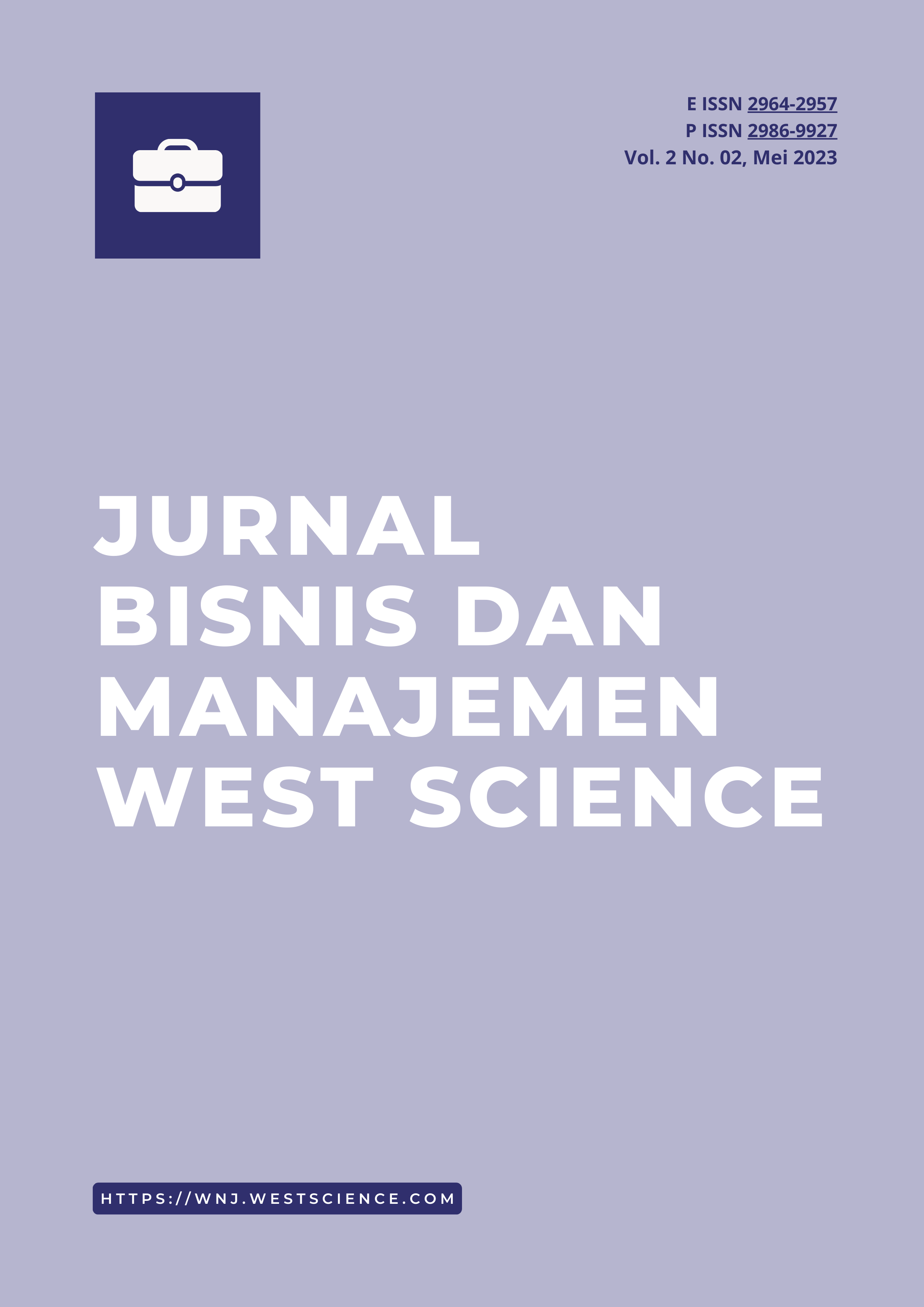Analisis Pengaruh Faktor Pendorong dan Penghambat terhadap Praktik Rantai Pasokan Hijau pada Pengganti Kantong Plastik: Model Persamaan Struktural pada Retail Modern
DOI:
https://doi.org/10.58812/jbmws.v2i02.342Kata Kunci:
Faktor Pendorong, Faktor Penghambat, Praktik Rantai Pasokan Hijau, Pengganti Kantong Plastik, Retail ModernAbstrak
Plastik merupakan benda yang menjadi banyak perhatian para peneliti dan pengiat lingkungan dikarekana banyak mencemari lingkungan. Kantong plastik belanja sekali pakai pada retail modern merupakan jenis plastik yang menurut penelitian banyak penyumbang sampah yang mencemari lingkungan hidup serta mengakibatkan jejak karbon yang menjadikan perubahan iklim. Oleh karena itu, diperlukan konsep dan praktik untuk merubah hal tersebut dimana salah-satunya Praktik Rantai Pasokan Hijau menjadi solusi dalam menangani masalah tersebut. Pada penelitian ini, peneliti ingin mengetahui faktor pendorong dan penghambat retail modern dalam menerapkan praktik rantai pasokan hijau untuk implementasi penggantian kantong plastik. Penelitian ini menggunakan metode survei pada retail modern di Bandung yang kemudian data diolah menggunakan SEM PLS. Hasil penelitian didapatkan bahwa faktor pendorong dan penghambat mempengaruhi dalam implementasi penerapan praktik rantai pasokan hijau dalam penggantian kantong plastik pada retail modern.
Referensi
Ahamed, A., Vallam, P., Iyer, N. S., Veksha, A., Bobacka, J., & Lisak, G. (2021). Life cycle assessment of plastic grocery bags and their alternatives in cities with confined waste management structure: A Singapore case study. Journal of Cleaner Production, 278. https://doi.org/10.1016/j.jclepro.2020.123956
Bentler, P. M., & Bonett, D. G. (1980). Significance Tests and Goodness of Fit in the Analysis of Covariance Structures. In Psychological Bulletin (Vol. 88, Issue 3).
Dijkstra, T. K., & Henseler, J. (2015). Consistent Partial Least Squares Path Modeling. Management Information Systems Research Center, University of Minnesota, 39(2), 297–316.
Fahmi, M. A. (2022a). Analysis of Green Purchase Intention in Coffee Shops and Restaurants: An Empirical Analysis. In Management, and Industry (JEMI) (Vol. 05, Issue 04).
Fahmi, M. A. (2022b). Analysis of Sustainable Business Performance in Staple Food Traders in West Java Province: An Empirical Analysis. In Management, and Industry (JEMI) (Vol. 05, Issue 03).
Garson, G. D. (2016). Partial least squares. Regression and structural equation models.
Ghozali, I., & Latan, H. (2015). Partial least squares konsep, teknik dan aplikasi menggunakan program smartpls 3.0 untuk penelitian empiris.
Hair, J., & Alamer, A. (2022). Partial Least Squares Structural Equation Modeling (PLS-SEM) in second language and education research_ Guidelines using an applied example _ Elsevier Enhanced Reader.
Hair, J. F. J., Hult, G. T. M., Ringle, C., & Sarstedt, M. (2017). A Primer on Partial Least Squares Structural Equation Modeling (PLS-SEM). Long Range Planning. .
Hair, J. F., Sarstedt, M., Hopkins, L., & Kuppelwieser, V. G. (2014). Partial least squares structural equation modeling (PLS-SEM): An emerging tool in business research. In European Business Review (Vol. 26, Issue 2, pp. 106–121). Emerald Group Publishing Ltd. https://doi.org/10.1108/EBR-10-2013-0128
Hair, J. F., Sarstedt, M., Ringle, C. M., & Mena, J. A. (2012). An assessment of the use of partial least squares structural equation modeling in marketing research. Journal of the Academy of Marketing Science, 40(3), 414–433. https://doi.org/10.1007/s11747-011-0261-6
Hair Jr, J. F., Hult, G. T. M., Ringle, C. M., Sarstedt, M., Danks, N. P., & Ray, S. (2021). Partial least squares structural equation modeling (PLS-SEM) using R: A workbook.
Henseler, J., Ringle, C. M., & Sarstedt, M. (2015). A new criterion for assessing discriminant validity in variance-based structural equation modeling. Journal of the Academy of Marketing Science, 43(1), 115–135. https://doi.org/10.1007/s11747-014-0403-8
Mathiyazhagan, K., Haq, A. N., & Baxi, V. (2016). Analysing the barriers for the adoption of green supply chain management-the Indian plastic industry perspective. In Int. J. Business Performance and Supply Chain Modelling (Vol. 8, Issue 1).
Novanda Sari, D., & Ainul Fahmi, M. (2022a). The Impact of LINKS (Local and Indigenous Knowledge Systems) on Human Resources Innovation Capability Strategy and Business Performance of Food and Beverage MSMEs. In Management, and Industry (JEMI) (Vol. 05, Issue 04).
Novanda Sari, D., & Ainul Fahmi, M. (2022b). The Impact of LINKS (Local and Indigenous Knowledge Systems) on Human Resources Innovation Capability Strategy and Business Performance of Food and Beverage MSMEs. In Management, and Industry (JEMI) (Vol. 05, Issue 04).
Oji Iheukwumere, S., Friday Nkwocha, K., Tonnie-Okoye, N., & Peter Umeh, P. (2020). A Look at Plastic Bags and Alternatives. JGME Journal of Geography Meteorology and Environment, 3(1), 121–134. https://journals.unizik.edu.ng/index.php/jgme
Petljak, K., Zulauf, K., Štulec, I., Seuring, S., & Wagner, R. (2018). Green supply chain management in food retailing: survey-based evidence in Croatia. Supply Chain Management, 23(1), 1–15. https://doi.org/10.1108/SCM-04-2017-0133
Ramayah, T., Jasmine, Y. A. L., Ahmad, N. H., Halim, H. A., & Rahman, S. A. (2017). Testing a Confirmatory model of Facebook Usage in SmartPLS using Consistent PLS. http://www.theijbi.net/
Shafique, M. N., Rashid, A., Bajwa, I. S., Kazmi, R., Khurshid, M. M., & Tahir, W. A. (2018). Effect of IoT capabilities and energy consumption behavior on green supply chain integration. Applied Sciences (Switzerland), 8(12). https://doi.org/10.3390/app8122481
Soykoth, M. W., Rahaman, M. M., Hossain, Md. A., & Alam, Md. J. (2022). Green supply chain and customer satisfaction in modern retailing: a dual-perception analysis with SEM approach.
Tseng, M. L., Islam, M. S., Karia, N., Fauzi, F. A., & Afrin, S. (2019). A literature review on green supply chain management: Trends and future challenges. In Resources, Conservation and Recycling (Vol. 141, pp. 145–162). Elsevier B.V. https://doi.org/10.1016/j.resconrec.2018.10.009
Unduhan
Diterbitkan
Cara Mengutip
Terbitan
Bagian
Lisensi
Hak Cipta (c) 2023 Muhammad Ainul Fahmi, Fadila Nurfauzia, Yuki Yulyadin

Artikel ini berlisensiCreative Commons Attribution-ShareAlike 4.0 International License.



















 Instagram
Instagram 